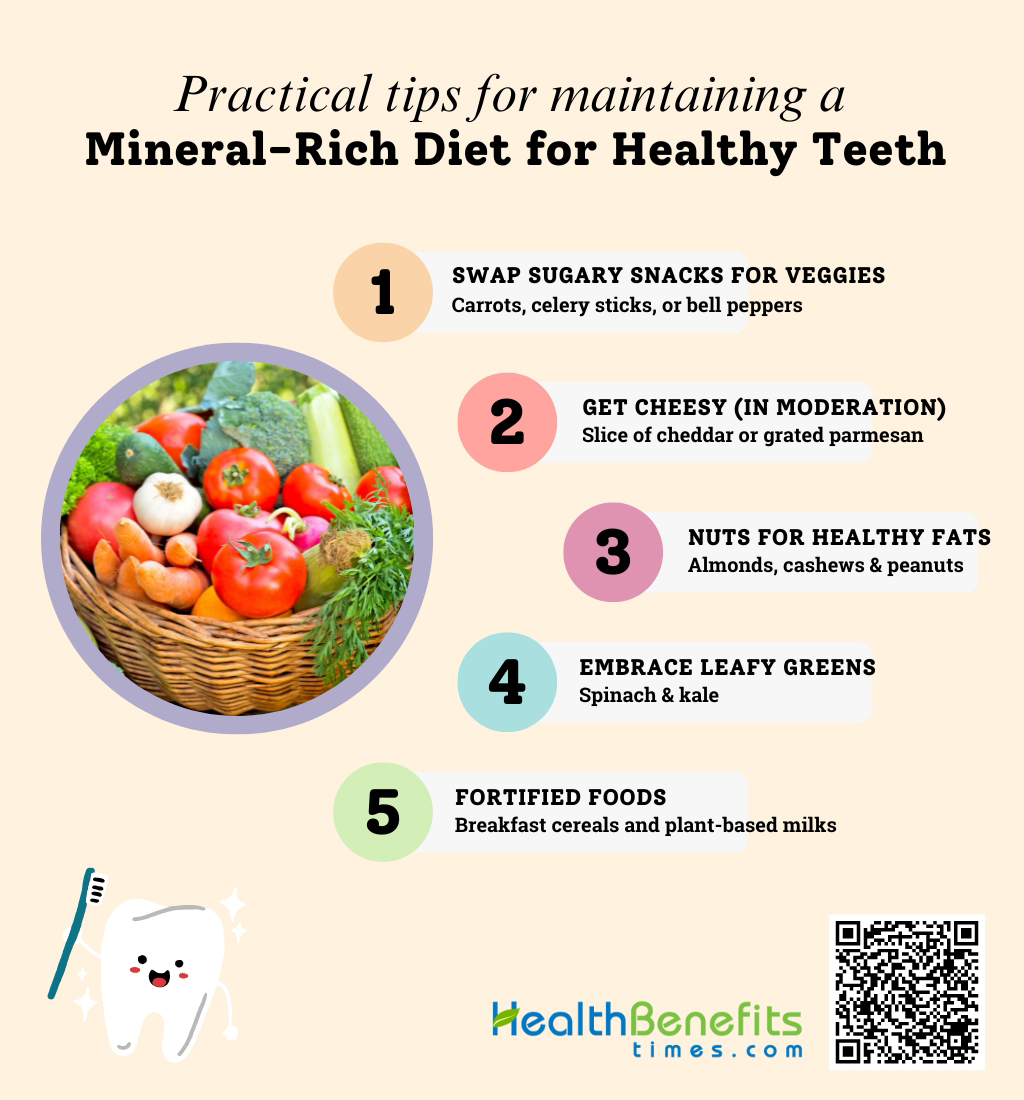 Ever wondered why dentists preach the importance of a balanced diet for your pearly whites? It’s not just about keeping cavities at bay. Minerals play a crucial role in building strong, healthy teeth, and deficiencies can lead to a whole host of dental problems.
Ever wondered why dentists preach the importance of a balanced diet for your pearly whites? It’s not just about keeping cavities at bay. Minerals play a crucial role in building strong, healthy teeth, and deficiencies can lead to a whole host of dental problems.
This article dives into the fascinating world of minerals and how they contribute to a dazzling smile. We’ll explore the key players—calcium, phosphate, and fluoride—and explain how each one safeguards your teeth, keeping them healthy and happy.
Calcium: The Building Block of Strong Teeth
Calcium is valuable when it comes to building strong, healthy teeth. Just like bricks form a sturdy house, calcium forms the foundation of your pearly whites. It makes up a whopping 99% of tooth enamel, the hard outer layer that shields your teeth from wear and tear. But calcium doesn’t stop there. It also plays a vital role in supporting the dentin, the layer beneath the enamel, and even contributes to healthy jawbones.
So, where can you find this mineral? Look no further than your grocery list. Dairy products like milk, cheese, and yogurt are excellent sources of calcium. Leafy greens like kale and collard greens are surprisingly calcium-rich as well. Fortified foods like cereals and plant-based milks can also be a great way to boost your calcium intake.
If you’re concerned you might not be getting enough calcium, there are some telltale signs to watch out for in your mouth. One symptom of calcium deficiency can be increased sensitivity in your teeth. This means hot, cold, or sweet foods and drinks might cause discomfort. Additionally, weakened tooth enamel due to low calcium can make you more prone to cavities.
Phosphate: Partnering with Calcium
Calcium doesn’t work alone in building strong teeth. Enter phosphate. Phosphate teams up with calcium to form hydroxyapatite, the main mineral that gives tooth enamel its remarkable strength. Think of them as partners in crime-fighting—calcium provides the structure, and phosphate reinforces it, creating a formidable shield against decay.
Just like calcium, phosphate is readily available in many delicious foods. Dairy products once again top the list, but you can also find phosphate in meat, poultry, fish, whole grains, nuts, and even some fruits and vegetables. Our Braintree dentist recommends incorporating a variety of these foods into your diet to ensure you’re getting enough phosphate for optimal dental health.
It’s important to note that calcium and phosphate work best in a balanced partnership. Too much or too little of either mineral can disrupt this harmony. While calcium deficiency can weaken teeth, a phosphate imbalance can also lead to problems like enamel erosion and gum disease.
Fluoride: Preventing Tooth Decay
Fluoride might not be as abundant in your diet as calcium and phosphate, but it plays a crucial role in keeping your smile healthy. This mineral acts as a double agent when it comes to tooth decay. Here’s how:
- Strengthens enamel: Fluoride integrates itself into the crystal structure of tooth enamel, making it harder and more resistant to acid attacks from plaque bacteria. This fortified enamel is less likely to erode and develop cavities. Studies have shown that fluoridated water can reduce tooth decay by up to 25% across all age groups.
- Reverses early decay: Fluoride isn’t just a preventative measure; it can actually help reverse the early stages of tooth decay. When plaque bacteria produce acid, it begins to break down the minerals in your tooth enamel. Fluoride can help remineralize these weakened areas, effectively reversing minor damage and keeping your teeth healthy.
Where can you find fluoride? Luckily, there are several ways to get your daily dose of this cavity-fighting champion:
- Fluoridated water: Many public water systems have fluoride added at optimal levels for dental health. You can check with your local water authority to see if your tap water is fluoridated.
- Fluoride toothpaste: Brushing twice daily with a fluoride toothpaste is an excellent way to deliver concentrated fluoride directly to your teeth. Look for toothpaste containing at least 1,000 ppm (parts per million) of fluoride for adults and children over the age of two.
- Professional fluoride treatments: Dentists can apply professional-strength fluoride treatments during your regular checkups. These treatments are particularly beneficial for children at high risk of cavities or those who don’t have access to fluoridated water.
Other Minerals and Vitamins Supporting Dental Health
 While calcium, phosphate, and fluoride are the MVPs of minerals for healthy teeth, a well-rounded team effort is what truly keeps your smile shining. Here are two other important players to remember:
While calcium, phosphate, and fluoride are the MVPs of minerals for healthy teeth, a well-rounded team effort is what truly keeps your smile shining. Here are two other important players to remember:
- Vitamin D: Remember how calcium is the superstar building block of tooth enamel? Vitamin D acts as the helpful coach, ensuring your body absorbs calcium effectively. Without enough vitamin D, even a calcium-rich diet might not be enough to fortify your teeth.
- Magnesium: This essential mineral works alongside calcium and phosphate, promoting healthy tooth development and mineralization. It also plays a role in maintaining strong jawbones, which provide a secure foundation for your teeth.
By incorporating a balanced diet rich in a variety of fruits, vegetables, dairy products, and whole grains, you’ll naturally be providing your body with the vitamins and minerals it needs to support strong teeth.
Practical Tips for Maintaining a Mineral-Rich Diet for Healthy Teeth
 Fueling your body with the right minerals doesn’t require a complete overhaul of your diet. Here are some simple tips to incorporate these tooth-friendly nutrients into your daily routine:
Fueling your body with the right minerals doesn’t require a complete overhaul of your diet. Here are some simple tips to incorporate these tooth-friendly nutrients into your daily routine:
- Swap sugary snacks for crunchy veggies: Ditch the chips and cookies for a colorful platter of baby carrots, celery sticks, or bell peppers. Not only are they packed with vitamins and minerals, but the act of crunching actually helps stimulate saliva production, which washes away food particles and neutralizes harmful acids in your mouth.
- Get cheesy (in moderation): Cheese is a fantastic source of calcium and phosphate. Enjoy a slice of cheddar with your whole-wheat crackers or sprinkle some grated parmesan on your lunchtime salad. Remember, moderation is key—cheese can also be high in fat, so stick to portion control.
- Go nuts for healthy fats and minerals: Almonds, cashews, and peanuts are powerhouses of calcium, magnesium, and healthy fats. Enjoy a small handful as a snack, or add them to yogurt or oatmeal for an extra crunch and nutrient boost.
- Embrace the power of leafy greens: Don’t underestimate the mighty spinach and kale. These dark leafy greens are brimming with calcium, Vitamin D (especially when fortified), and other essential nutrients that contribute to overall dental health.
- Don’t forget the power of fortified foods: Many breakfast cereals and plant-based milks are fortified with calcium and Vitamin D. Check the labels at the grocery store to find options that give your daily diet a mineral boost.
While a mineral-rich diet is crucial, don’t underestimate the importance of professional dental care. Schedule regular checkups and cleanings with your dentist. They can monitor your oral health, identify any potential issues early on, and provide personalized advice to keep your smile sparkling.
Conclusion
A dazzling smile is more than just a pretty face; it’s a window to your overall health. By understanding the essential minerals that keep your teeth strong and healthy, you can take charge of your oral care. Remember, a balanced diet is just one piece of the puzzle. Regular dental checkups and cleanings are vital for catching potential problems early and ensuring your oral health stays on track. So, next time you reach for a snack, consider opting for a mineral-packed option—your healthy smile will thank you for it.

